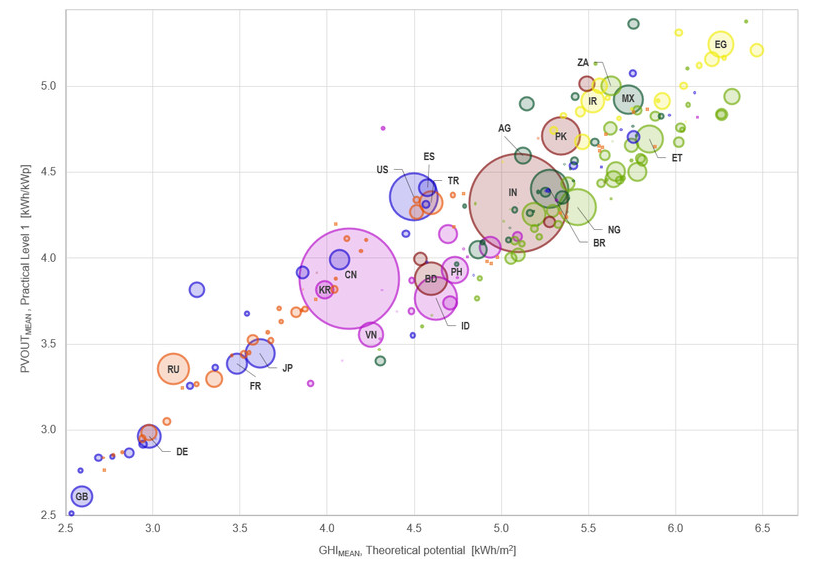Ocean Solar, Battery Ships and a Windy issue.
As the new British government begins its drive to hit Net Zero targets, I've considered where would be best for the UK to place solar farms. Spoiler - it isn't on fields and land.

As the new British government begins its drive to hit Net Zero targets, I've considered where would be best for the UK to place solar farms. Spoiler - it isn't on fields and land.
We in the UK is mapped for its solar potential - we have to be realistic in the fact that we aren't blessed with sunny skies. Latterly, we've been blessed with Milk Skies - the perpetual blanket of weird white cloud!
The Global Solar Atlas is worth a read - and the image below maps solar potential by practical levels. There's GB! Bottom left... Reading this, and given 10 minutes to decide - would you genuinely suggest putting solar panels on farmland or housing land was a good idea?

Fifth Largest Exclusive Economic Zone
But hang on. We're an island, with a good history of maritime and merchant expertise. We're also endowed with a vast and huge global footprint of ocean territory - or as the global rules-based system calls it, Exclusive Economic Zone. It spans from the Caribbean, the mid-Atlantic, the Indian Ocean and the Pacific Ocean.
Sunnier places. Whilst the Caribbean is exposed to hurricane seasons, many of our other global territories are not in cyclone or hurricane territory. Ocean storms can happen anywhere - but looking at global weather, there are certainly more volatile places!
Bermuda alone has 173,890 square miles of EEZ. Pitcairn has 322,823 square miles of EEZ. British Indian Ocean Territory has 246,552 square miles. Ascension Island has 170,525 square miles. St. Helena has 171,783 square miles.
Are you starting to get the picture?
Where the sun doesn't shine
I neglected to mention the 212,693 square miles of EEZ around the Falkland Islands. It's, um.... a bit windy down there. The territory, famous because of the brief war fought over it in 1982, is vast and viable for lots of different industries - which is probably why we've clung to it.
We're already very good at building wind farms offshore - it seems to me the perfect, the perfect place to build these farms would be in the Falklands. It might also help solve a couple of other crises, too - migration, and relations with Argentina. (In that the Falklands just leap up our priority list.)
Solar Rigs
Anyway - back to sunnier climes. Since oil was discovered in the North Sea in the 1970s, we've been dragging large hunks of metal into the ocean with hundreds of well-paid humans on board - to drill for oil.
This expertise is massive for the solar era. We should be making giant solar rigs. Master stations for floating barges and pylons - forests of solar arrays. The rig itself acts as the maintenance mothership. Because it's likely the wear and tear at sea would be pretty severe. The engineering challenge would be initially significant - but in context of the vast territory we have to do this on, the economies of scale would be rapid.
Panels would likely best be sheathed or stored at night - unfurled for the sun.
The UK has suffered two major rig disasters - Piper Alpha and Alexander L. Kielland - the latter caused by 12 metre waves and high winds! It should not be under-estimated that rigs have to exist in a brutal environment. But there are 184 rigs in the North Sea alone - accidents and issues are clearly rare, even in treacherous seas!
Battery Ships
The main issue with electricity generation in the UK is our grid system. Electricity is designed to be generated "and used" within the nationwide circuit. There isn't a giant Duracell park storing the excess we don't use - it's all just in time, or sloshing around the system poised for use.
Perhaps our marine expertise is the place to go?
We are now part of the CPTPP with Japan and have a good trading relationship with South Korea. It is entirely feasible that we'd be able to strike a tri-party deal to design and build a fleet of "battery bulk carriers" that store and move electricity (precisely as we've moved oil all these years). Because these solar rigs will generate a LOT of electricity.
Underlying that would also be an inter-connector network - with the UK joining up all its ocean territories with cabling - working with allies where there are line of sight gaps.
A fleet of battery ships would make the trade in this surplus electricity easier. It would also allow for aid support to be rapid and Electricity Banks to make KWH an investable asset. We just need to start building them.
